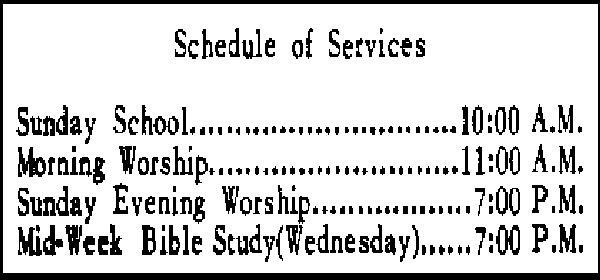
|
 |
 |
 |
|
 
|
|
|
IS WATCHFULNESS REALLY IMPORTANT?
In God's wise purpose spiritual leaders (pastors) are designed to be "watchmen" -- for the glory of God and the welfare of His people. This involves great responsibility. One of the Greek terms designating the pastoral office in the New Testament is rendered "bishop". It means "an overseer, a watchman", one who stands guard in behalf of the flock. It is sad that so many seem to desire the office without taking seriously the responsibilities that go with it.
The prophet, Isaiah, relates a sad story concerning the ancient watchmen of Israel, (56:10-12). He pictures the beasts of the field as coming to devour God's people while the watchmen were: (1) BLIND; (2) IGNORANT, incapable of understanding; (3) DUMB DOGS, that cannot sound a warning; (4) GREEDY DOGS that never have enough for themselves; (5) FALSE SHEPRERDS whose only concern is for their own temporal prosperity; (6) DECEIVING THEMSELVES with a false sense of security, they love to slumber; and the sheep are forgotten. Such untrustworthy watchmen are severely rebuked by the Word of God and have yet to face the judgment of the
|
|
|
|
true Shepherd.
But the responsibility of watchfulness does not end with spiritual leaders. Watchfulness is the personal responsibility of every child of God.
Watchfulness requires that one be AWAKE. Such as are asleep, or even slothful, are incapable of watchfulness, (Matt. 24:43; 26:38, 40-4l). It is well to remember however, that these terms are often used in various metaphorical ways.
Wakefulness is sometimes used, in a figurative sense, of "alertness" and serious mindedness; whereas SLEEP is so used of "carelessness" and infidelity to one's spiritual duty, (I Thes. 5:6-7). Again, "wake" and "sleep" appear to be used in a figurative way to differentiate between those who are physically "alive" or "dead" at our Lord's appearing, (I Thes. 5:1). One may not be able to find another such usage in the New Testament, but he will find it in the Septuagint version of the Old Testament (Dan. 12:2) where it is, unquestionably, used of the physically dead -- some being raised to "everlasting life", others to "shame and everlasting contempt".
Whatever one does with
(Continued on Page 4)
|
|
|
|
|
Page - 2
"JOY" -- ITS BIBLICAL USAGE
In both the Old and New Testaments JOY is the consistent mark of the individual and church that follows the Lord. It is more than an emotion; it is a QUALITY -- grounded upon God Himself, and certainly derived from Him, (Psa. 16:11; Phil 4:4; Rom. 15:13). This joy ought to characterize the life of every Christian on earth (I Pet. 1:8). It anticipates the blessedness of being with Christ for ever in His coming Kingdom, (Rev. 19:7; Matt. 25:21-23).
IN THE OLD TESTAMENT this JOY is related to the total national and religious life of Israel. It is expressed particularly in terms of noisy, tumultuous excitement at: festivals, (I Sam. 18:6; Psalm 100); sacrifices, (Deut. 12:6-7) and at enthronements, (I Kings 1:30-40). Spontaneous JOY is a prevailing feature of the Psalms. It is therein a mark of both Personal
|
|
|
|
worship, which centered largely in the Temple (Psa. 42:4; 81:1); personal adoration, (Psa. 16:8; 42:4, 43:4); and anticipation of God's Kingdom, (Psa. 30:5). And Isaiah conceives of joy in terms other than that which is merely ritualistic. He associates it with the fulness of God's salvation in anticipation of a future state. He sees it as being universal, (Isa. 49:13; 61:10-11; 12:3; 35:10; 51:11).
IN THE NEW TESTAMENT it is interesting to notice its usage in the first three Gospels and in the writings of Paul. The first three evangelists record the note of joy in connection with the proclamation of the Gospel of the Kingdom: at the Saviour's birth, (Luke 2:10); at the triumphal entry, (Mk. 11:9; Luke 19:37); and again following the resurrection, (Matt. 28:8).
In John's Gospel it is Jesus Himself who communicates this joy, (15:11; 16:24). It is seen as being the result of a deep fellowship between Christ and His church, (Jn. 16:22).
In the book of Acts JOY marks the very life of the early church. It accompanies: the gift of the Spirit to the disciples, (13:52); the miracles performed in the name of Christ, (8:8); In the fact and report of conversion among the Gentiles, (15:3); and characterized the very fellowship of the early church, (2:46).
FINALLY, PAUL USED THE TERM IN VARIOUS WAYS. He connected it with spiritual progress. Specifically, those whom he had led to the Lord were a cause of joy, (I Thes. 2:19
(Continued on Page 4)
|
|
|
|
|
"THE DAY OF THE LORD"
This expression, appearing often in the Scriptures, describes a time still future when God, in Christ, will finally subdue all things to Himself and rule the earth in righteousness, (I Cor. 1:8; 5:5; 2 Cor. 1:14; I Thes. 5:2; 2 Thes. 2:2; 2 Pet. 3:10; comp. Amos 5:4-20). This "day" consists of a period of 1,000 years, (2 Pet. 3:8).
Several kindred expressions seem to designate the same "day": "DAY OF CHRIST", (Phil. 1:6, 10; 2:16); "THE DAY", (I Cor. 3:13; I Thes. 5:4; cf. Heb. 10:25); "THAT DAY", (2 Thes. 1:10; 2 Tim. 1:12, 18; 4:8 cf. Matt. 7:22; 24:36; Luke 10:12; 21:34); "THE DAY OF THE SON OF MAN", (Luke 17:24, 26); "THE DAY OF GOD", (2 Pet. 2:12); "THE DAY OF VISITATION" (I Peter 2:12); "THE GREAT DAY", (Jude 6; Rev. 6:17 16:14); and "THE LAST DAY", (Jn. 6:39-40, 44, 54; 11:24; 12:48).
The "Day of the Lord" will come as a day of judgment and fierce anger upon the rebellious and unbelieving, (Matt. 10:15; 11:22-24; 12:36; 2 Pet. 2:9; 3:7; I Jn. 4:17). In that "day" the dead will be raised and judged -- though not all at the same time, (I Thes. 4:13-18; I Cor. 15:12-23, 51). The whole human race will be judged in the court of God and of Christ, (Rom. 14:10; 2 Cor. 5:10; Matt, 25:32). The authority of judgment has been delivered into the hands of Jesus as the "Son of Man", (John 5:22). It is inescapable, (Rom. 2:3; Gal. 5:10; I Thes. 5:3). Both the living and the dead will be judged, (2 Tim. 4:1; Acts 10:4). God will
|
|
|
|
Page - 3
examine our hearts and try our work by His divine fire, (Rom. 2:16; Rev. 2:23; I Cor. 3:13-15; 2 Cor. 5:10; 11:15; Eph. 6:8; of. Matt 16:27; I Pet. 1:17; Rev. 20:12; 2: 12). What has been "sown" will be "reaped", (Gal. 6:7-9; Rev, 14:15). In fierce anger against sin, God will destroy the powers of evil, (Rom. 9:22; I Cor.l5:24-26; 2 Thes. 2:8). Evil men shall also be the objects of His wrath, (2 Thes. 1:7-10; Matt. 13:41; Rom. 2:8-9; Eph. 5:6; 2 Pet. 3:7; Rev, 6:17; 11:18).
The "Day of the Lord", beginning with Christ's return in power and great glory, will be a day of salvation for all whose lives have been joyfully yielded up to His control, (Rom. 2:7, 10; I Pet. 1:5). This salvation will consist of: Freedom from bondage to sin and the flesh, (Eph.4:30; Rom. 8:23); Rest and Peace, (Acts 3:20; I Thes. 1:7; Heb. 4:5-11; Rom. 14:17); Reward, (Matt. 5:12); Rev. 11:18); Honor (I Pet. 5:6; Praise, (I Cor. 4:5); and Glory, (Rom. 8:17-18; I Cor. 15:43; Col. 3:4; Matt. 13:43).
The "Day of the Lord" is coming, (Rom. 13:12; James 5:8; I Pet. 4:7; I Thes. 5:5, 8). Let us prepare for it! Adequate preparation requires that we: receive God's gift, by faith; appropriate God's grace for living; that we watch AGAINST trials and trickery and FOR the appearing of our Lord; and that we use wisely the time that remains, (Col. 4:5; Eph. 5:16).
*************
I have no care, 0 blessed God!
For all my cares are Thine.
I live in triumph, Lord, for thou
Hast made Thy triumphs mine.
|
|
|
|
|
WE SAY IT AGAIN!
Once again we have received letters of encouragement and acknowledgements of blessings received through the ministry of the CLARION HERALD. For these letters, testimonies and financial support we say again: "THANK YOU! YOUR WORDS OF ENCOURAGEMENT ARE A SPECIAL BLESSING TO US AT THIS TIME!"
There appear to be a few brethren who fear that the sphere of our influence is surpassing what they consider safe bounds. I trust that this "fear" will not work for them such a "snare" as will hinder their usefulness, nor ours, in the service of Jesus.
Continue to PRAY for this ministry.
-- the Editor
|
|
|
|
"JOY" .... Continued
Phil. 2:2). According to him, real Christian joy may, paradoxically, be the outcome of suffering and sorrow "for Jesus' sake" -- for it is produced by the Lord, and not by ourselves, (Col. 1:11, 24; 2 Cor. 6:10; I Pet. 4:13; Heb. 10:34; comp. Jas. 1:2). It is a GIFT of the Holy Spirit -- something dynamic, not static, (Gal. 5:22). It is derived from love (God's and ours) and is closely associated with it in various places. Since it is a gift that may be interrupted by SIN (Psa. 51:12), every believer is urged to continue in the joy of his Lord by: Walking with Him daily, in light, (I Thes. 5:14-23; Phil. 3:1; 4:4; I Pet. 1:8; I Jn. 1:7); and by a daily practice of rejoicing in the knowledge of Christ and in the experience of His salvation, (Matt. 5:11-12).
The people of God ought always to rejoice, (Neh. 8:10; Heb. 10:32-36); His Word is a firm foundation for this experience, (Jer. 15:16; Ps. 126:5).
WATCHFULNESS .... Continued
I Thessalonians 5:10, he must NOT foolishly and presumptuously imagine that "it makes no difference whether one is watchful or careless, because there will be no difference in the resurrection". That is NOT what the passage says; such an idea would have the apostle contradicting himself -- neutralizing his own warnings and exhortations.
In view of eternity, WATCHFULNESS IS OF VITAL IMPORTANCE! EG
|
|
|
|
|
 |
 |
 |
|




